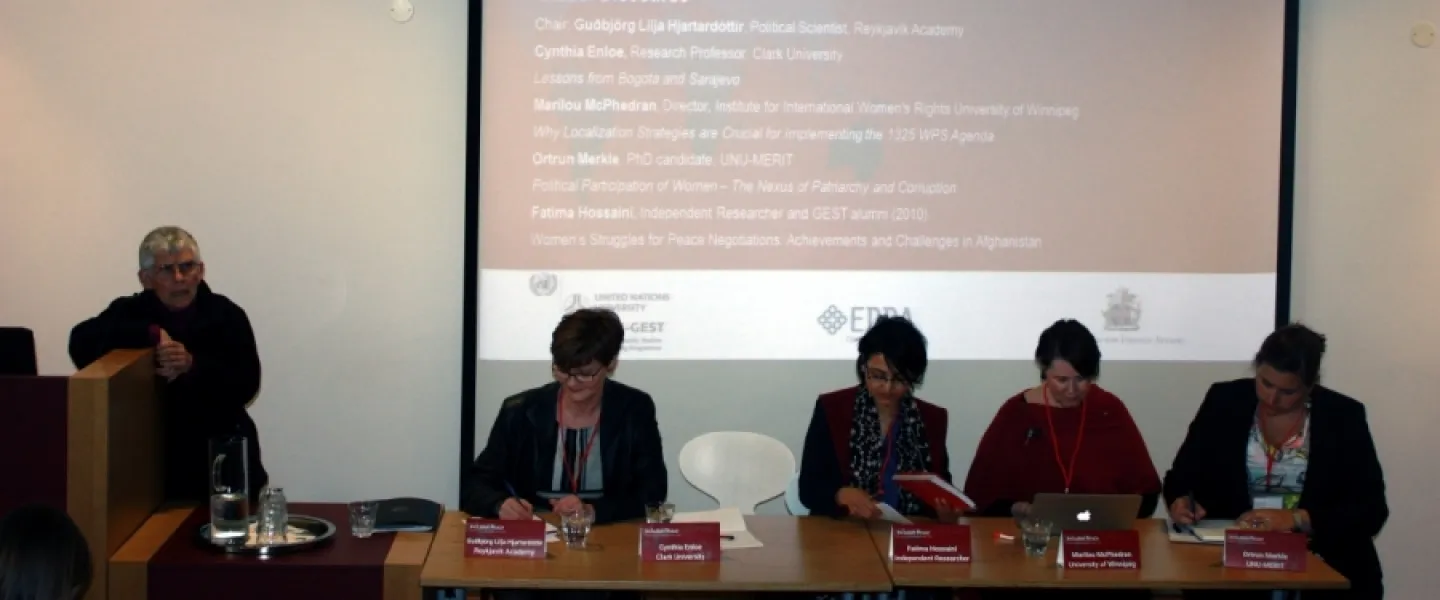
The international conference Inclusive Peace: Women, Peace and Security Post 2015 was held at the National Museum of Iceland in Reykjavík on 14– 15 April 2016. The conference addressed the progress and implementation of the Women, Peace and Security (WPS) agenda, and was organised by United Nations University Gender Equality Studies and Training Programme (UNU-GEST) and EDDA – Research Center at the University of Iceland, with support from Icelandic Ministry for Foreign Affairs.
The purpose of the conference was to discuss aspects of United Nations Security Council Resolution (UNSCR) 1325, and to highlight the obstacles that still limit its implementation. The opening panel of the conference was comprised of speeches from Marriët Schuurman, Ambassador and NATO Secretary General’s Special Representative for Women, Peace and Security, Cynthia Enloe, Research Professor at Clark University in the United States, Kristian Berg Harpviken, Director of Peace Research Institute in Oslo (PRIO) and Gréta Gunnarsdóttir, Ambassador for Human Rights at Icelandic Ministry of Foreign Affairs. Lilja Alfreðsdóttir, the new Foreign Minister of Iceland, gave the opening address.
The conference explored three key themes. First, it examined the prevention of sexual and gender-based violence, gender awareness in conflict prevention and early warning systems. Georgina Holmes, Research fellow at University of Reading in England, spoke on gender mainstreaming in the Rwanda Defence Force. Laura Khoury, Professor of Social and Behavioural Science at Birzeit University in Palestine, followed with a discussion regarding alienating discourse on violence against indigenous women in UNSCR 1325. Katherine Wright, Research fellow at University of Surrey in England, spoke on a European approach to women, peace and security, focusing on the EU as a regional actor. The first session was concluded with a talk on the prevention of sexual violence in conflict by Kristian Berg Harpviken, and a discussion on applying a comprehensive gender lens to violence conflict and peace by Henri Myrttinen, Head of Gender and Peacebuilding at International Alert in England.
The second session focused on the participation of women in peace processes, paying special attention to mechanisms designed to increase the number of women at all levels of decision-making institutions and to strengthen partnerships with local women’s organisations. Cynthia Enloe began the session, followed by talks on the importance of localisation strategies in the implementation of UNSCR1325 by Marilou McPhedran, Director at the Institute of International Women’s Rights at University of Winnipeg in the United States, political participation of women under the nexus of patriarchy and corruption by UNU-MERIT fellow Ortrun Merkle, and women’s struggle for peace and negotiation in Afghanistan by independent researcher and GEST alumni Fatima Hossaini.
Finally, the third session addressed women’s roles and participation in conflict transformation as setting the stage for a just and gender-sensitive foundation for peace, particularly in the realms of transitional justice and post-conflict reconstruction. Marriët Schuurman opened the session with a talk focusing on a global study of UNSCR1325’s implementation, supporting the need for further focus on participation and prevention as well as protective measures. Marsha Henry, Deputy Director of LSE’s Centre for Women, Peace and Security, spoke on a three-fold analysis of problems of peacekeeping for Women, Peace and Security. Rebekka Friedman, Lecturer at King’s College London, addressed stigma, invisibility and agency within gendered dimensions of transitional justice and peace-building in Northern Sri Lanka. Independent researcher Jessica Bombasaro-Brady concluded the final part of the conference with a talk on police reform, sexual violence and restoring civic trust in Bosnia-Herzegovina.